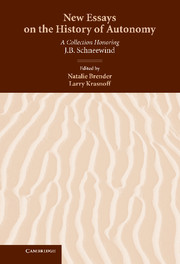8 - Autonomy, Plurality and Public Reason
from PART TWO - AUTONOMY IN PRACTICE
Published online by Cambridge University Press: 24 July 2009
Summary
“Kant,” writes Jerry Schneewind in the first sentence of The Invention of Autonomy, “invented the conception of morality as autonomy” (IA 3). He sees this invention most fundamentally as a conception of morality as self-governance, which can replace more traditional moralities of obedience and avoid their persistent difficulties.
There are, Schneewind notes, “various conceptions of self-governance” (IA 5). The specifically Kantian inflection of self-governance equates it with autonomy, that is, with the thought that “we ourselves legislate the moral law” (IA 6) or that “It is only because of the legislative action of our own will that we are under moral law” (IA 483). Autonomy or self-legislation is the fullest conception of self-governance. Earlier writers moved in the direction of a morality of self-governance but did not articulate the idea fully; they still saw God and obedience to God's law as indispensable to morality. Voluntarists had seen morality as God's creation, the arbitrary fiat of His will; intellectualists had seen it as reflecting eternal truths that were mirrored both in the Divine and (more confusedly) in human intellects. Kant decisively rejects both voluntarism (IA 495ff.) and intellectualism and proposes a conception of morality as autonomy.
In The Invention of Autonomy Schneewind neither summarises Kant's position nor offers an extended exegesis (IA 483), assuming that readers are familiar with the position.
- Type
- Chapter
- Information
- New Essays on the History of AutonomyA Collection Honoring J. B. Schneewind, pp. 181 - 194Publisher: Cambridge University PressPrint publication year: 2004
- 4
- Cited by

